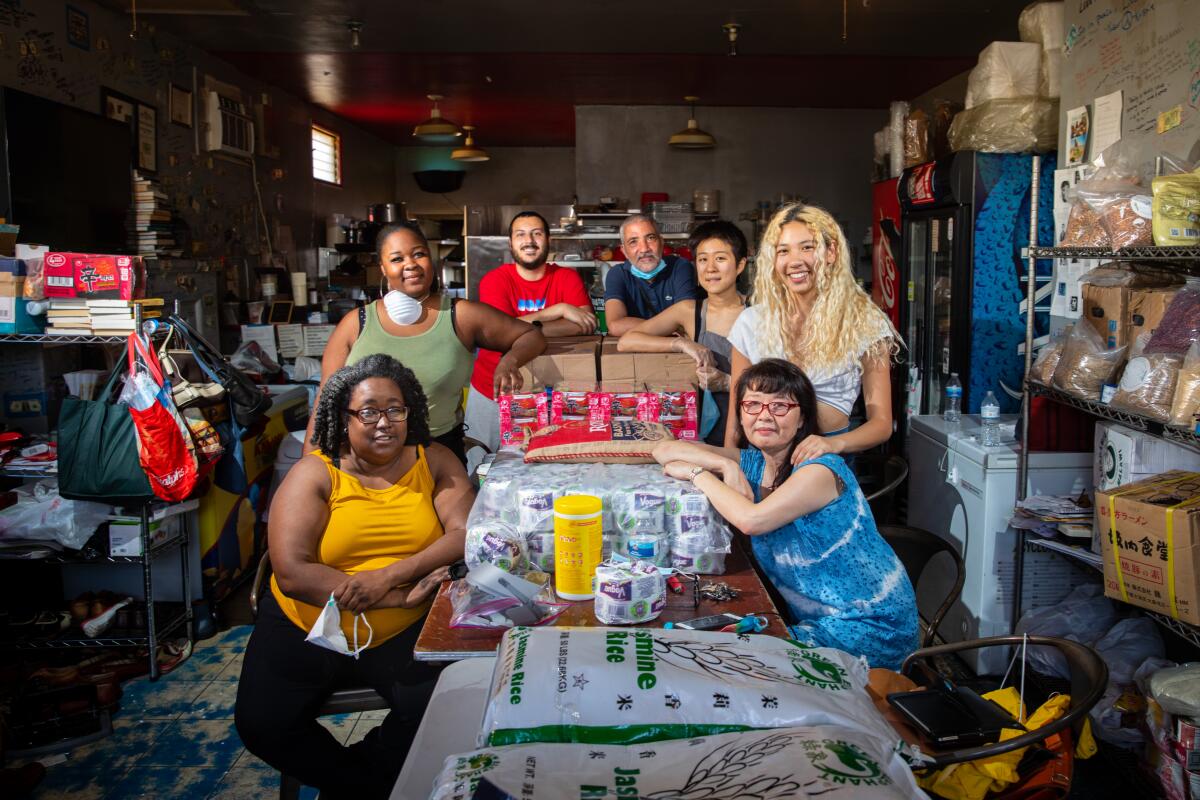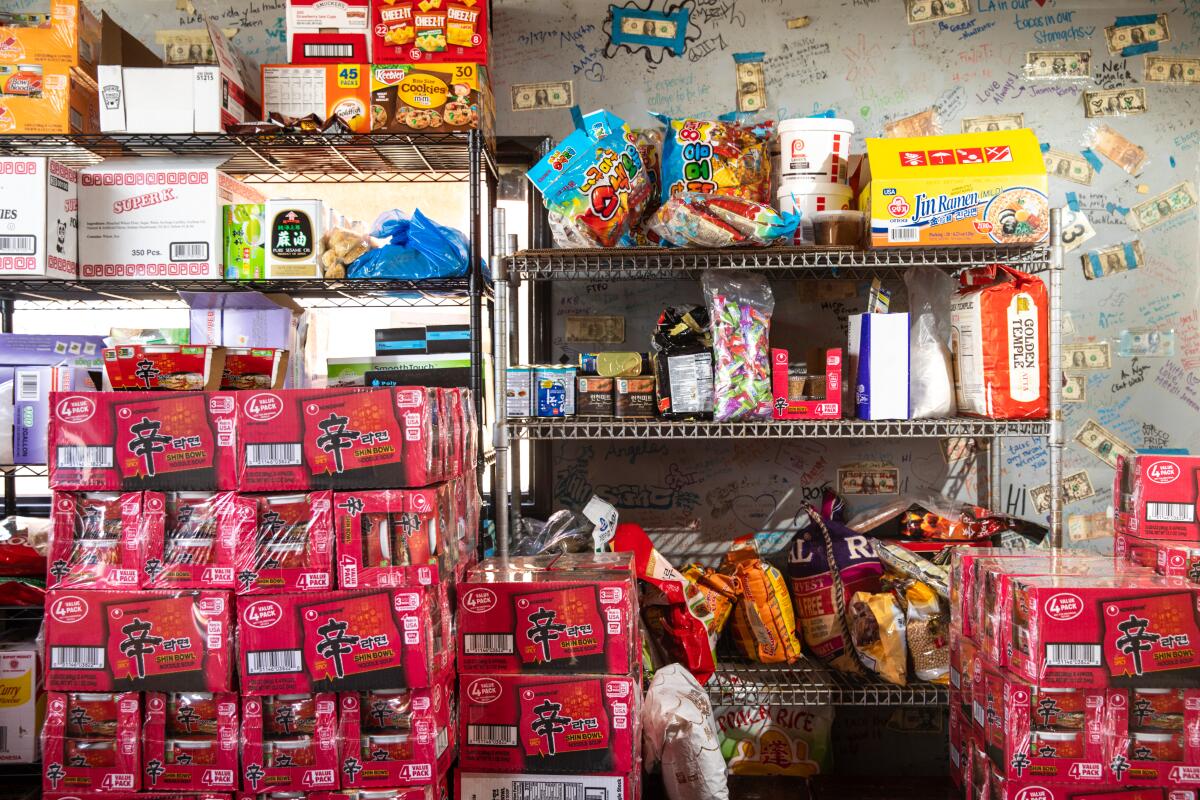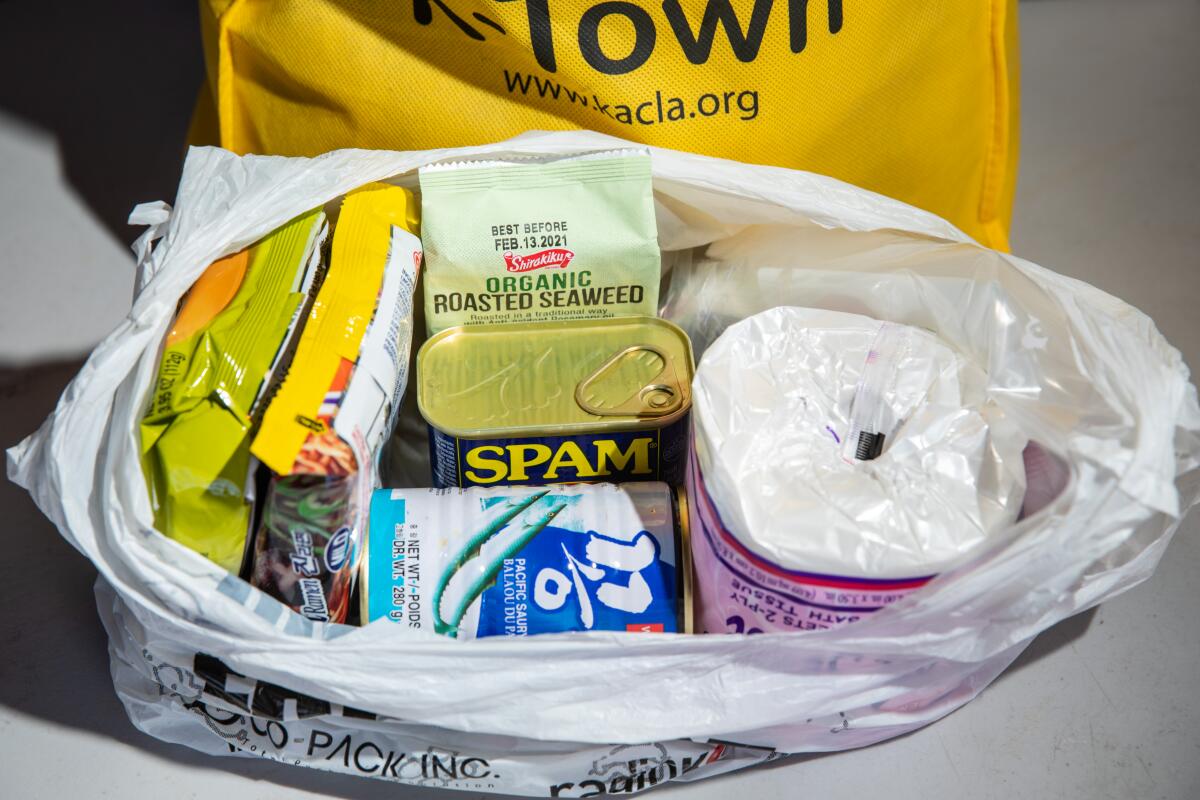This couple turned their taqueria into a food bank

- Share via
You’d be forgiven for mistaking Revolutionario, the North African taqueria in Exposition Park, for a survivalist’s bunker rather than a working restaurant.
The taqueria, which chef Farid Zadi and his wife, Susan Ji Young Park, opened in 2015, now resembles a hoarder’s home.
Shelves in the dining room are stocked with Spam, canned mackerel, dried soybeans, lentils, fortune cookies, Lawry’s seasoning salt, packets of jam, black-eyed peas, panko, soy sauce, fish sauce, oolong tea and cup ramen. A squat bag of 500 pairs of socks sourced from Korea sits beside another shelf where Keebler cookies and Sriracha mingle.
Well before the pandemic hit Los Angeles, the couple decided to drastically curtail the restaurant’s hours to focus on delivering food and other needed supplies, first to skid row, then to unhoused Korean seniors. Since then, what was a de facto food bank has become a full-time one.
“I could see for myself that business was tanking in Chinatown at the end of December,” said Park. “In January, it got worse and worse and I thought: ‘If January is like this?’”
In February, Park started a nonprofit, Asian Americans for Housing, and partnered with other nonprofits and organizations in Koreatown, Little Tokyo, Thai Town, Chinatown and the Vietnamese community in Orange County to expand their reach to other Asian American communities. “Older and poorer Asian Americans tend to be vastly ignored because of the language,” said Park, who speaks Korean and some Spanish.
Park connected with Zerita Jones, a community organizer in South L.A., to deliver food and supplies to black seniors. Soon, Red Boat gave them bottles of fish sauce, Nongshim dropped off pallets of instant ramen and Japanese food specialist the Mutual Trading Co. loaded an SUV with frozen food.

Park and Zadi have roped their family — they live upstairs above the taqueria — into the effort. The couple’s 21-year-old daughter, Kamilah, son Elias, 17, and Kamilah’s boyfriend, Ziad Shalabi, pitch in. Jones conscripted daughter Zenae Lawrence to help too.
Jones started distributing hot meals from Revolutionario first to the seniors in her own complex, Chesapeake Apartments. “Sometimes we’ll reach out, giving out bags with notes inside. ‘Hey, hope you’re OK,’ with a note and a phone number. I’m not a stranger; that helps.”
On a recent weekday, Park sat at the restaurant’s communal dining table, her laptop dwarfed by the sacks of various rices — she sources “culturally conscious” food for each community she serves.
“If they have rice, kimchi and soybean paste, tofu and cabbage, that’s food security,” Park said of Korean seniors.
Zadi, a French-Algerian chef who for years was an instructor at Pasadena’s Cordon Bleu, cooks hot meals for the food bank with help from Susan, Kamilah and Brittany Ko, Revolutionario’s operations manager. On weekends, he makes a partial Revolutionario menu — including soup harira, merguez kefta and halal fried chicken — for contactless pick-up.
Park raises funds by partnering with other organizations, big and small, and by asking people to donate (Revolutionario has not yet received a loan from the Paycheck Protection Program).
“Our mission is to fill in gaps and cracks,” Park said, by supplying not only meals and food but also clothing, personal care products, even cash.

“I understand supply chain and wholesale distribution,” said Park, whose parents, first-generation Korean immigrants, ran a wholesale business. “Need a COVID-19 T-shirt? I can hook you up,” she said.
Jones was seated across a mountain of toilet paper from Park, her mask pulled up on her head like a yarmulke. “I ask local people, especially the women. They remember,” Jones said of how the community comes together to identify seniors in need.
Jones and her team are now distributing to almost 500 seniors in Crenshaw and nearby neighborhoods. (Jones and Park share more than their outreach program: They recently discovered that they attended the same Encino junior high, where Jones was among the first group of African Americans bused into the Valley neighborhood.)
What parts of the dining room walls that aren’t obscured by supplies are graffitied with well wishes in English, Spanish and Mandarin, and taped with paper bills like a neighborhood bar. An Algerian flag hangs from the ceiling.
“There’s enough food for our family of four here to eat for two years,” said Park. “What were we going to do? Isolate? Hoard?” She smiled.
“We don’t have a choice; the whole system has been reset.”
More to Read
Eat your way across L.A.
Get our weekly Tasting Notes newsletter for reviews, news and more.
You may occasionally receive promotional content from the Los Angeles Times.











